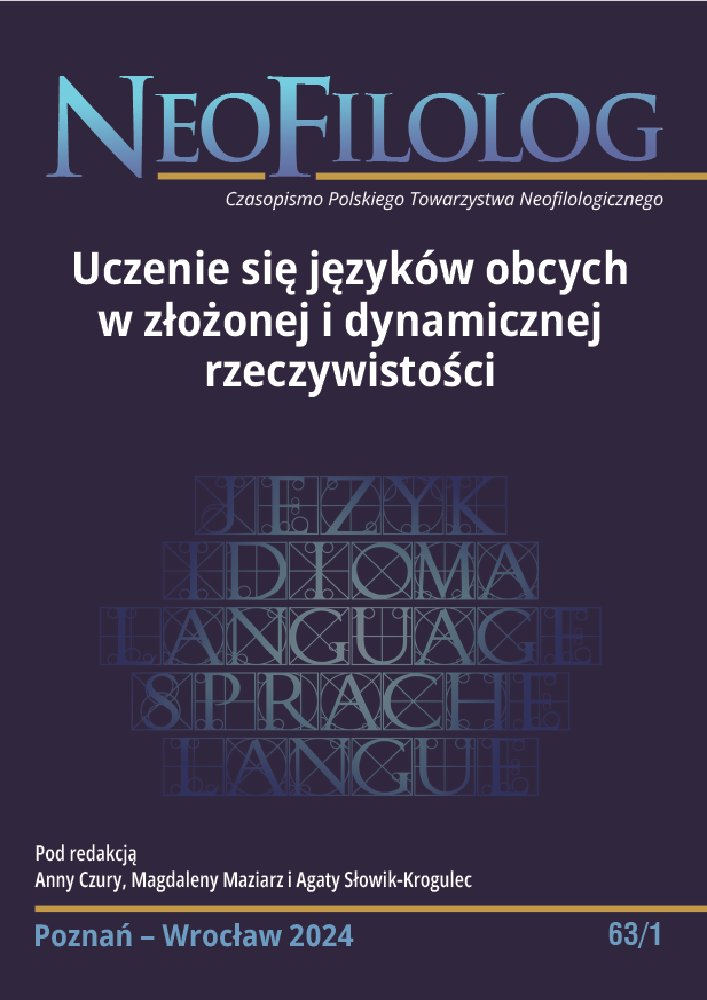Abstract
Among the foreign language learning strategies classified by R. Oxford (1990) as indirect are affective strategies, to which the researcher assigns an important role in regulating the process of acquiring knowledge and skills. One of the basic tools used for this purpose is a diary, which helps a learner identify their feelings, attitudes and motivations related to language learning. It can be kept both in the form of individual notes on paper or through electronic entries on a group forum, including interactive exchange of reflections. The change in the formula makes it not only a personal record, but also a testimony of various cognitive experiences that we share with others. The aim of the article is to present the changes taking place in the chosen form of the diary, which becomes not only a place for reflection, but also for the exchange of learning experiences, including metacognitive and social strategies. The research conducted in the period from the academic year 2018/19 to 2022/2023 covered five classes of first-year students of French Philology at the University of Wrocław and was aimed at examining preferences in relation to an open or closed form of keeping a diary of the learning strategies used. During the longitudinal research, statements from learners were collected (207 questionnaires), which pointed out the advantages and disadvantages of both forms of diary and commented on the usefulness of the tool in reflection on learning strategies used in practice.
References
Bartnitzky J. (2004), Einsatz eines Lerntagebuchs in der Grundschule zur Förderung der Lern- und Leistungsmotivation. Eine Interventionsstudie. Praca doktorska. Online: https://eldorado.tu-dortmund.de/bitstream/2003/2944/1/BartnitzkyKurzanhangunt.pdf [DW 05.09.2023].
Cadet L. (2007), La genèse des « journaux de bord d’apprentissage ». „Le français aujourd’hui”, vol. 4, nr 159, s. 39–46. DOI: https://doi.org/10.3917/lfa.159.0039
Derenowski M. (2009), Próba ewaluacji „dziennika” jako narzędzia badawczego. „Neofilolog”, nr 33, s. 21–28. DOI: https://doi.org/10.14746/n.2009.33.3
Gebhard J.G., Oprandy R. (1999), Language Teaching Awareness: A Guide to Exploring Beliefs and Practices. Cambridge, New York: Cambridge University Press.
Głowiński M. (1973), Gry powieściowe. Szkice z teorii i historii form narracyjnych. Warszawa: Państwowe Wydawnictwo Naukowe.
Górecka J. (2022), Konstruowanie wiedzy w pisemnych i asynchronicznych interakcjach online. Nowe możliwości dla dydaktyki języków obcych. Poznań: Wydawnictwo Naukowe UAM.
Grabowska M., Wiater A. (2023), Rola nieformalnego uczenia się języków obcych w świadomości studentów filologii francuskiej. „Neofilolog”, nr 60/2, s. 328–361.
Łopatyńska L. (1950), Dziennik osobisty, jego odmiany i przemiany. „Prace Polonistyczne”, seria 8, s. 253–280.
Nerlicki, K. (2009), Dzienniczki uczących się jako narzędzie badawcze – próba oceny. „Neofilolog”, nr 32, s. 151–161. DOI: https://doi.org/10.14746/n.2009.32.12
Newby D., Allan R., Fenner A.-B., Jones B., Komorowska H., Soghikyan K. (2007), Europejskie portfolio dla studentów – przyszłych nauczycieli języków. Warszawa: Centralny Ośrodek Doskonalenia Nauczycieli.
Oxford R.L. (1990), Language Learning Strategies. What Every Teacher Should Know. Boston: Heinle & Heinle Publishers.
Oxford R.L. (1993), Research on Second Language Learning Strategies. „Annual Review of Applied Linguistics”, nr 13, s. 175–187. DOI: https://doi.org/10.1017/S0267190500002452
Podolska J. (1990), Refleksje nad kształtem dziennika literackiego. „Prace Polonistyczne / Studies in Polish Literature”, seria 46, s. 197–223.
Turula A. (2018), E-learning akademicki: perspektywa humanistyczna. Kraków: Wydawnictwo Naukowe UP.
Wiater A. (2016), Stimuler la parole à travers la peinture. L‘entraînement à la créativité dans la perspective du développement de l‘expression orale en langue étrangère. Wrocław: Oficyna Wydawnicza ATUT.
Wiater A. (2024), Le journal de bord comme outil visant le développement des stratégies d’apprentissage. „Academic Journal of Modern Philology”, vol. 21 (Special Issue), s. 105–115.
Wilczyńska W., Michońska-Stadnik A. (2010), Metodologia badań w glottodydaktyce. Kraków: Avalon.
License
Copyright (c) 2024 Aleksander Wiater

This work is licensed under a Creative Commons Attribution-NoDerivatives 4.0 International License.
Authors
Authors of texts accepted for publication in Neofilolog are required to complete, sign and return to the Editorial team’s office the Agreement for granting a royalty-free license to works with a commitment to grant a CC sub-license.
Under the agreement, the authors of the texts published in Neofilolog grant Adam Mickiewicz University in Poznań a non-exclusive, royalty-free license and authorize the use of Attribution-NoDerivatives 4.0 International (CC BY-ND 4.0) Creative Commons sub-license.
The authors retain the right to the free disposal of the work.
Users
Interested Internet users are entitled to use works that have been published in Neofilolog since 2017, under the following conditions:
▪ attribution – obligation to provide, together with the distributed work, information about the authorship, title, source (link to the original work, DOI) and the license itself.
▪ no derivatives – the work must be preserved in its original form. Without the author's consent, it is not possible to distribute the modified work in the form of translations, publications, etc.
Copyrights are reserved for all texts published since 2017.
Miscellaneous
Adam Mickiewicz University in Poznań retains the property right as a whole (layout, graphic form, title, cover design, logo etc.).

